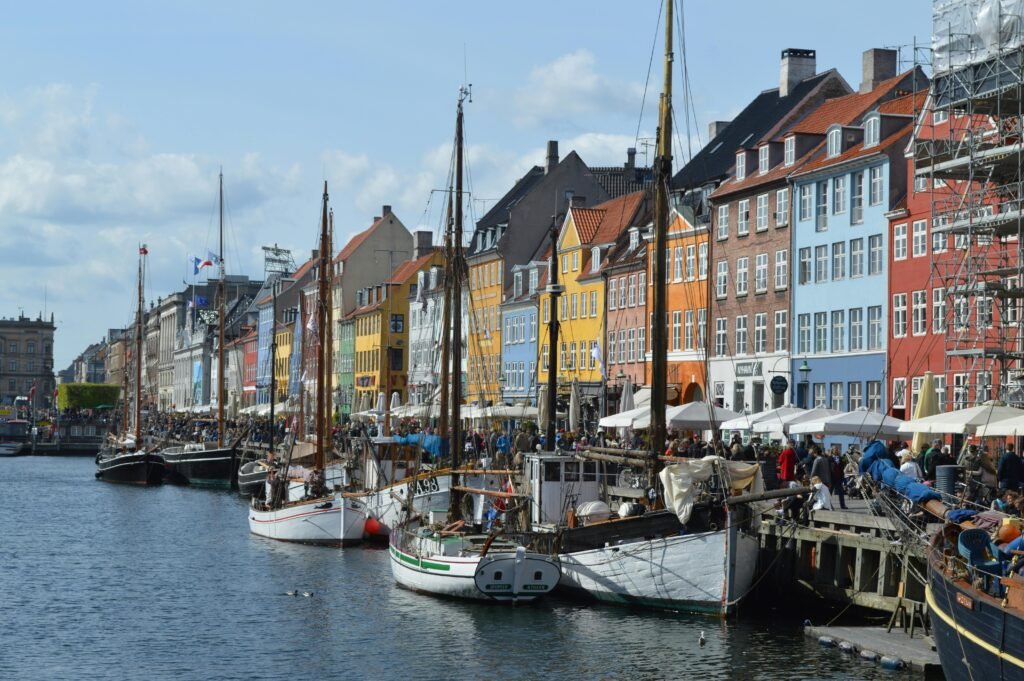🇩🇰Ready to start a new adventure across the Channel? If you’re planning a move to Denmark, this guide will give you all the practical steps, updated costs, and streamlined advice you need for a smooth transition.
What should I know about living in Denmark at a glance?
- Flag: 🇩🇰
- Population: 5.9 million
- Currency: Euro (EUR) — Note: Denmark uses the Danish Krone (DKK), but prices may also be compared in EUR for reference
- Average salary: between EUR 50,000 and EUR 55,000 per year
- Live EUR ←→ Dollar: Use dynamic currency converters for the latest exchange rates
Reviewed by Statistics Denmark, last updated in June 2025; Danmarks Nationalbank Monetary and Financial Statistics Department, last updated in July 2025; XE Financial Data Team, last updated in July 2025.
How much does it cost to move door-to-door to Denmark?
The cost of moving to Denmark depends on shipment size and transport method. Typical market rates as of mid‑2025 are:
| Move Type | Time | Cost (EUR or USD) |
| 20 ft container (FCL)⁺ | ~2–6 weeks | USD 1,150–3,800 (≈ EUR 1,100–3,600) |
| 40 ft container (FCL)⁺ | ~2–6 weeks | USD 2,150–4,850 (≈ EUR 2,100–4,600) |
| Air freight (~1 m³ / ~200 kg, door-to-door) | ~3–5 days | Typically higher (use a freight calculator) — air freight is fast but significantly more expensive |
| Customs & duties fees | — | EU duty 0–5 % + 25 % VAT on CIF value (varies) |
Reviewed by Freight Market Analysis Team (iContainers, BR Logistics, Freightify, NEX), last updated in mid-2025
Use a real-time moving cost calculator for tailored quotes with ReloAdvisor.
Real-life case:
“I moved to Aarhus in May 2025 with about 30 cubic meters of personal belongings using a 20ft container from Los Angeles. The total cost—including pick-up, sea freight, and delivery to my new home—was around EUR 3,950. I worked with a relocation company in Denmark that handled customs clearance at the Port of Aarhus, coordinated delivery through residential streets with limited parking, and assisted with translating official documents into Danish.”
— Sarah L., moved in May 2025
Importantly, many people moving to Denmark choose to relocate to one of the five most popular cities in the country, including Copenhagen, Aarhus, Odense, Aalborg, and Esbjerg. These cities offer a mix of history, modern infrastructure, cultural life, and strong expat communities—making them top choices for newcomers from the Netherlands and beyond.
What are the customs and duty rules when moving belongings?
If you’re relocating to Denmark, you may qualify for duty-free and VAT-free import of used household goods under Danish Customs rules. To be eligible:
- Items must have been owned and used for at least 6 months.
- You must have lived outside the EU for 12 consecutive months.
- Goods must arrive within 6 months before or 12 months after your move.
At customs, present:
- Inventory list of goods.
- Proof of residency abroad.
- Passport or residence permit.
⚠️ New items, vehicles, or high-value goods may be subject to 25% VAT + duties.
Reviewed by the Danish Customs Agency (Toldstyrelsen), last updated in mid-2025
What is the cost of living in Denmark?
The average monthly cost of living in Denmark for a single occupant—including rent, groceries, transport, and utilities—is approximately €2,000–2,200 per month. These figures reflect national averages and are updated quarterly using data from industry sources.
| Expense | Denmark (EUR/month) |
| Rent (1-bedroom flat in city centre) | ~€1,200 / outside centre ~€900 |
| Groceries (single person) | ~€250–300 |
| Transport (monthly public transit pass) | ~€60–80 |
| Utilities (electricity, heating, etc.) | ~€150–200 |
Reviewed by Numbeo Data Quality Team, last updated in July 2025
What do I need to know about Denmark visas and residency?
A Danish visa or residence permit is required for most non-EU/EEA/Swiss citizens. Options include the Short-Stay Schengen Visa (Type C), Long-Stay National Visa (Type D), Work Visa, Student Visa, Family Reunification, and the EU Blue Card. Denmark also offers residence permits for certain self-employed entrepreneurs and researchers.
- Visa categories and eligibility check: https://www.nyidanmark.dk/en-GB/Applying
- Visa application portal (for appointments and documents): https://applyvisa.um.dk/
Reviewed by the Danish Immigration Service (SIRI) and the Ministry of Foreign Affairs of Denmark (UM), last updated in June 2025

What’s required to import a car or swap a driving licence?
If you’re moving to Denmark, you must declare your vehicle at customs and pay applicable import duties, 25% VAT, and registration tax (registreringsafgift), unless you qualify for exemptions under the change of residence scheme. Imported vehicles must comply with EU safety and emissions standards and undergo technical inspection (Syn) before being registered.
Driver’s licences from EU/EEA countries are valid in Denmark and can be used without exchange.
For licences from non-EU countries, you may need to exchange your licence within 90 days of establishing residence in Denmark. Some countries (e.g. the UK, Japan, South Korea, Switzerland, and certain U.S. states) have reciprocal agreements allowing licence exchange without testing. Others may require passing a theoretical and/or practical driving test.
Reviewed by the Danish Motor Vehicle Agency (Motorstyrelsen) and Danish Customs Agency (Toldstyrelsen), last updated in July 2025
How can I bring pets with me to Denmark?
Pets entering Denmark must be microchipped, vaccinated against rabies, and accompanied by an EU health certificate or EU Pet Passport (for pets from EU/Schengen countries). For pets arriving from non-EU countries, a valid veterinary certificate issued within 10 days before travel is required.
Import requirements vary by species (e.g. dogs, cats, ferrets), and certain dog breeds may face additional restrictions under Denmark’s banned dog breeds list.
If arriving from outside the EU, pets must enter through designated entry points and may be subject to document checks by the Danish Veterinary and Food Administration (Fødevarestyrelsen).
Using a licensed pet relocation service and preparing all documents in advance ensures compliance with Denmark’s pet travel regulations and helps reduce stress for both the owner and the animal.
Reviewed by the Danish Veterinary and Food Administration (Fødevarestyrelsen), last updated in March 2025
How do I open a bank account and get Denmark’s social security number?
To open a Danish bank account, you’ll need:
- Passport or national ID
- CPR number (Danish personal identification number)
- Proof of address in Denmark (rental contract or official letter)
- Sometimes proof of employment, study, or income
Most major banks in Denmark offer newcomer-friendly accounts, online banking in English, and low-fee options for residents and students.To get a Social Security Number (CPR), register your address at the local Citizen Service (Borgerservice) office with:
- Passport or national ID
- Residence permit (if applicable)
- Proof of address (e.g. rental contract)
This CPR number is required to work legally, access public healthcare, open a bank account, and pay into Danish social benefits.
Reviewed by the Danish Agency for Digitisation and the Ministry of the Interior and Health, last updated in November 2024

How to Navigate the Housing Market as a Newcomer to Denmark?
In Denmark, renting usually requires a 1–3 month deposit plus one month’s prepaid rent. Utilities (electricity, heating, water, internet) are often not included in the listed rent. To rent, you’ll typically need:
- Passport or national ID
- CPR number (Danish personal identification number)
- Proof of income or job/study contract
To buy property in Denmark, budget an extra 3–4% for property transfer tax, notary fees, and legal costs.
Top areas in Denmark for newcomers:
- Copenhagen: Cultural and economic hub, diverse neighborhoods from historic Indre By to beachside Amager.
- Aarhus: University city with vibrant arts scene and modern harborfront apartments.
- Odense: Affordable housing, family-friendly, rich cultural heritage.
- Aalborg: Lively student population, redeveloped waterfront, growing tech sector.
- Esbjerg: Key North Sea port, lower rental costs, gateway to offshore energy jobs.
Reviewed by Boligsiden.dk and The Danish Ministry of Housing, last updated in March 2025
How to Understand Your Tax and Pension Obligations in Denmark?
If you’re a tax resident in Denmark (living more than 183 days per year or having significant ties like housing, work, or family), you’re taxed on your worldwide income. Contributions to Arbejdsmarkedets Tillægspension (ATP) and other labour market schemes are mandatory, covering pensions, unemployment, and certain social benefits. Denmark also has double tax treaties with over 70 countries to prevent double taxation on foreign income.
| Tax Component | Description | Notes |
| Income Tax | On global income | Progressive rates: ~27%–52%, varies by municipality |
| Social Contributions | Covers pension, unemployment | ATP contributions shared between employee and employer; Denmark has no separate healthcare contribution as it’s tax-funded |
| Double Tax Treaties | Avoid double taxation | Agreements with 70+ countries |
Reviewed by Skattestyrelsen and ATP Pension, last updated in April 2025
Where can I find tools and more resources before moving?
For further guidance, make use of the volume calculator, book a video survey, or explore comprehensive guides for Portugal and Hungary with ReloAdvisor.



